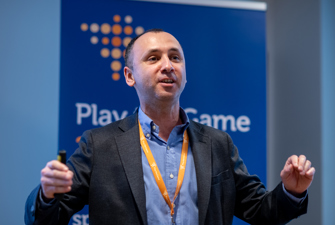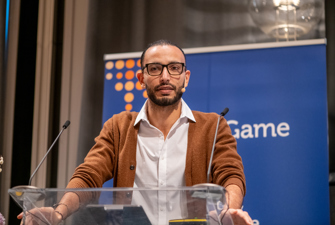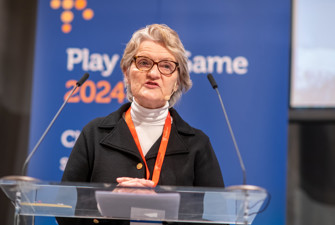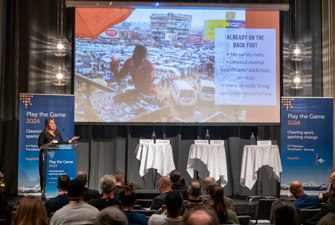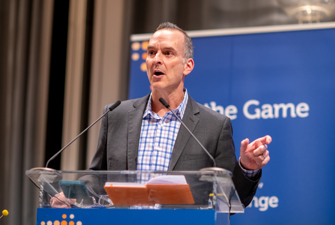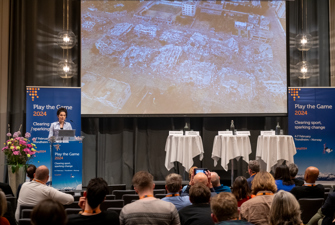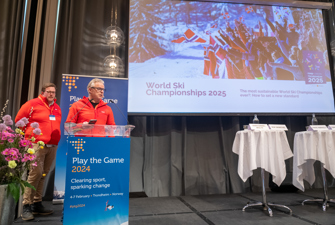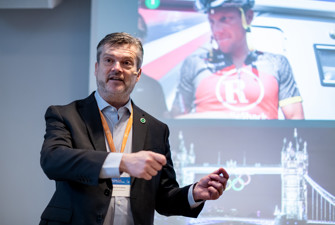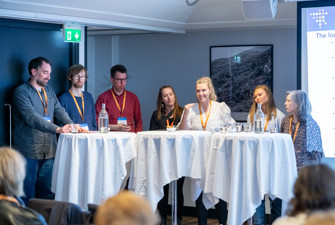Play the Game 2024: "It is too early to close the home for homeless questions in sport"
The big international sports organisations are eroding their own new standards of governance, and the struggle to bring the darker sides of sport into the limelight is far from over, participants heard in the welcome speeches at Play the Game 2024 that begins today.
Today, the 13th Play the Game conference opened in Trondheim, Norway, with more than 400 participants. The conference is organised in collaboration with the Norwegian University of Science and Technology (NTNU) and has attracted journalists, academics, sports leaders, athletes, and other stakeholders from all over the world to discuss some of the most pressing issues facing modern sport.
While the room buzzed with excitement for the days to come, the opening speeches by Play the Game's head of conference, Stanis Elsborg, and international director, Jens Sejer Andersen, also reflected that despite 27 years of raising one important issue in international sports debate after another, much still remains to be done.
"In my opening remarks at our 25th anniversary conference in 2022, I argued that the old saying that Play the Game is a home for the homeless questions in sport should be rephrased and turned into Play the Game is the right place for the right questions in sport. But while it felt right at the time, I have since realised my call came much too early," said Elsborg.
"Perhaps the increasing media coverage of the darker sides of sport, kick-started by the World Cup in Qatar, clouded my judgment. Maybe I was blinded by the fact that Play the Game at that time was receiving up to 15-20 media inquiries a week from international media. It was as if the questions were not homeless anymore, but people were actually starting to talk about them – perhaps even in the hallways of the major sports organisations."
"But dear delegates, almost two years later, my conclusion is that it is too early to close the home for the homeless questions in sport. Because the reality is that the struggle for journalists, academics, NGOs and other professions and advocates to bring the darker sides of sport into the limelight is still a tough and, at times, a very lonely fight," he continued.
New governance standards are quickly eroded
Play the Game's international director compared the situation in international sports politics to the myth of Sisyphus who was sentenced by the Greek gods to roll a boulder to the top of a steep hill only to watch it roll down again and start over in all eternity.
"It is hard not to think about Sisyphus these days as we watch how the most powerful sports leaders deny the spirit of the governance reforms that brought themselves to power," he said.
"These reforms were introduced some ten years ago, when international sport came under huge pressure from the media, the fans and politicians in the wake of the FIFA scandals, among others.
As we speak, three presidents of the world's most powerful sports federations – UEFA, FIFA, and the International Olympic Committee – are all ready to bend, or do not rule out bending, the limits of their terms as president."
Andersen pointed to another example of erosion of relatively new governance standards in sport:
"In FIFA, promises were made a decade ago that the selection of World Cup host countries should no longer be made in the closed circle of the Executive Committee, but in an open and transparent process involving the congress."
"But these promises seem long forgotten. When FIFA in one move appointed the hosts of the men's world cup for 20230 and de facto secured Saudi Arabia the right to host the World Cup 2034, the process laughed in the face of all the promises made to football fans, players, sponsors, journalists, and governments in the past decade," Andersen said.
But there is also hope, Andersen stressed and pointed to the fact that athletes are beginning to demand a say in how their sporting life is organised and that public prosecutors have established an international network with support from the Council of Europe to prosecute corruption and crime from the world of sport.
"We also found motivation when our latest conference in 2022 sent a clear message to Play the Game to start reviving the old idea of an international, all-encompassing agency to combat sports crime, corruption and abuse. This inspired us to ask some 250 experts and stakeholders about how such an agency could work. No less than 80 per cent chose to respond, feeding us more than 800 insightful comments. That is a very convincing signal that people with insight in sports corruption and crime are impatient to see progress in their field," Andersen said.
Over the coming four days, more than 200 speakers will share their knowledge, opinions, and case studies in more than 40 sessions, and as an extra service for those unable to attend, Play the Game will be livestreaming 16 sessions from the conference on its website.
The livestreaming can be accessed from the conference site, and pictures from the conference will be updated continuously on Play the Game’s flickr account.
